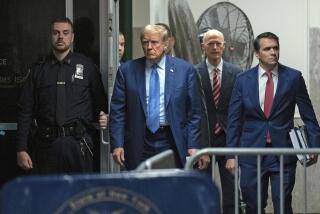The Courtrooms Are Open, Now Itâs Up to the Lawyers
WASHINGTON â The Supreme Courtâs rulings Monday on prisoner rights in the war on terrorism open the courthouse doors to hundreds of suspects, but how wide and how soon remains to be seen.
The rulings clear the way for hearings for nearly 600 prisoners from the battlefields of Afghanistan and elsewhere who have been held at the U.S. naval base in Guantanamo Bay, Cuba -- and to at least one U.S. citizen whom President Bush has designated an âenemy combatantâ and confined to a military brig in South Carolina without charges or legal counsel.
Praised by defense lawyers, civil liberties groups and Democratic members of Congress, the rulings represented a defeat for the Bush administrationâs position that U.S. courts were off-limits to terrorism suspects trying to prove that they had been illegally detained.
âWe cleaned their clocks,â said Frank W. Dunham Jr., a federal public defender who represented American-born terrorism suspect Yaser Esam Hamdi -- who was captured in Afghanistan and whose right to a lawyer and a hearing was backed by the high court, 8 to 1.
Military lawyers and other experts said the rulings also could provide protections for prisoners outside the U.S. and Cuba -- such as those in U.S.-controlled detention facilities in Iraq and Afghanistan -- and grounds for attacking the use of military tribunals in lieu of federal courts for prosecuting the Guantanamo Bay detainees.
It was unclear whether the ruling would affect high-ranking Al Qaeda prisoners like Khalid Shaikh Mohammed, the mastermind of the Sept. 11 attacks, or Ramzi Binalshibh, a key plotter, since their location is not known. If they are held in third countries, but not directly under U.S. control, the decision may not apply, experts said.
Still others said the rulings ultimately could lead to civil damage suits against the U.S. by prisoners who can establish they were wrongfully held.
âWhat happens next is in large measure a function of the creativity of the lawyers for the detainees,â said Eugene Fidell, president of the National Institute of Military Justice, a trade group of lawyers involved in military cases. âAll we have at the moment is a holding that the courts are open.â
Still undecided are such issues as the timing and venues of the hearings, the rights of prisoners to call witnesses and challenge the evidence against them, and the available avenues of appeal.
Steven Shapiro, legal director of the American Civil Liberties Union, said that while there was âgoing to have to be more discussions in the lower courtsâ about the nature of the hearings called for by Mondayâs rulings, judges would be under pressure to afford defendants a meaningful chance to make their case.
âIf there is a jerry-rigged set of procedures in the trial court that deprive Hamdi of an ability to present his case in a serious fashion and challenge the government evidence in a serious fashion, then the court is going to step in,â Shapiro predicted. âPolitically, it would be very, very difficult for the president to order the trial of an American citizen in front of a military tribunal.â
Lawyers for inmates at the facility in Cuba were starting to translate the courtâs words into action; some said the rulings could spell the beginning of the end of the prison camp.
Tom Wilner, a Washington lawyer for a group of 12 Kuwaiti prisoners, said he would file papers in U.S. District Court in Washington within the next several days to compel the Defense Department to convene at least military-style hearings for his clients as soon as possible and to provide long-withheld information about their health.
The Pentagon last week announced that Navy Secretary Gordon R. England would oversee annual reviews of all Guantanamo detainees to determine whether they should be held. Military justice experts said the review process probably would need to be changed to pass muster under Mondayâs high court ruling. A senior defense official said: âWe will review the courtâs rulings, and weâll see how to modify the existing procedures to satisfy the court.â
Some members of Congress said the rulings would focus attention on pending legislation that would spell out the rights of individuals in U.S. custody, including how military tribunals would be conducted in the prosecution of suspected terrorists.
Rep. Adam B. Schiff (D-Burbank), a member of the House Judiciary Committee who has introduced legislation dealing with detainees, said in an interview that he thought the court reached a âpretty sensible result and balanced a very difficult set of competing interests.â
âThe courts stepped into the void because Congress abdicated its responsibility to set out the limits of executive power over its own citizens,â Schiff said.
Lawyers for the three Guantanamo Bay prisoners who already have been charged with crimes suggested that the Supreme Court rulings also have significance for their clients, who face military tribunals under a procedure established by Bush in 2001.
A military lawyer said the ruling appeared to clarify that prisoners at Guantanamo could ask for cases decided in a military tribunal to be appealed in federal courts, which currently would not be allowed.
âOnce youâve exhausted your military avenues of relief, I think with the Supreme Courtâs ruling that the courts are open to them, certainly that could give us an avenue for seeking certain types of relief,â said Lt. Col. Sharon Shaffer, who represents Ibrahim Ahmed Mahmoud al Qosi.
Times staff writer Richard Simon contributed to this report.
More to Read
Sign up for Essential California
The most important California stories and recommendations in your inbox every morning.
You may occasionally receive promotional content from the Los Angeles Times.










